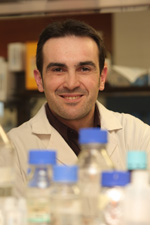A thesis doctoral student from the University of Navarra wins the XIII edition of award Syva
The research, carried out by David García Yoldi, develops new techniques for the control of brucellosis.

A doctoral thesis for the control of brucellosis, developed at the University of Navarra, has won the XIII edition of the award Syva for the best research in the field of animal health. The study, carried out by researcher David García Yoldi and directed by Ignacio López-Goñi, has developed new techniques for the detection and differentiation of brucellosis, one of the so-called 'neglected diseases'.
The research, carried out in the department of Microbiology and Parasitology of the academic center, aims to contribute to the control of this pathology in the third world, where it has become one of the five most serious diseases suffered by animals but which directly affects humans.
The award, of annual periodicity, has an economic endowment of 15,000 euros, provided by the veterinary pharmaceutical company. The laboratories Syva and the University of León created this award with the aim of encouraging the scientific training in the field of animal health. It also values any aspect of health projected on microbiology, immunology and infectious or parasitic diseases. This award, due to the issue of thesis presented and their scientific quality, is already considered one of the most prestigious in its field area.
5 articles, 1 patent and 4 veterinary kits
In the present call, 22 thesis defended in Spain, Mexico and Portugal during academic year 2008-2009, and qualified with Pass 'cum laude' by the corresponding academic committee have participated.
The technique developed by García Yoldi is based on the molecular amplification of genetic sequences by PCR (polymerase chain reaction), which is also recommended in the 'guide of bovine brucellosis' of the World Organization for Animal Health (OIE).
In addition, the results of research have led to the publication of five scientific articles in specialized international journals, an international patent and the development of four kits for veterinary use, developed by the biotechnology company Ingenasa, business .
